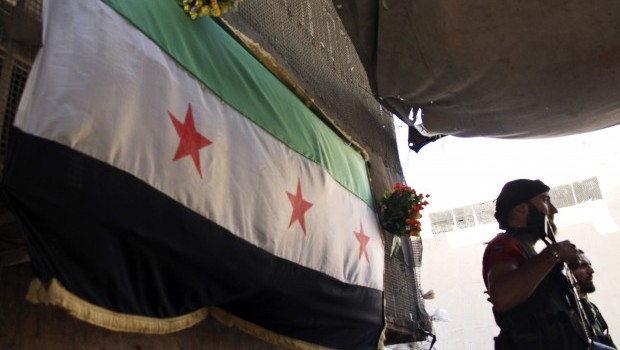
Free Syrian Army fighters hold their weapons while standing near an opposition flag at their post in Aleppo’s Bustan Al-Qasr on May 29, 2013. (REUTERS/Aref Hretani)
Last night, Syria’s fractious opposition issued its first major statement on the proposed peace conference, after days of fierce internal debate in the Turkish city of Istanbul.
The short declaration from the organization appeared to call for Bashar Al-Assad and members of his family to leave or be removed from power as a precondition for negotiations.
The statement reiterated that the SNC considers it necessary for the “head of the regime, security and military leadership to step down and be excluded from the political process.”
However, it avoided making any explicit statement on whether it will attend the conference, which is planned for June.
At the same time, the Syrian government says it is not opposed to taking part in the conference, but insists that Bashar Al-Assad will remain president until at least 2014, following a series of battlefield successes that have bolstered the regime’s self-confidence.
According to the Lebanese press, President Assad recently told Hezbollah’s Al-Manar TV station that “the Syrian army has scored major victories against armed rebels on the ground and the balance of power is now with the Syrian army.”
His comments echoed those made by his government’s foreign minister Walid Muallem, who said on Wednesday: “Our armed forces have regained the momentum…. From now until the next elections [in 2014], President Bashar Assad is president of the Syrian Arab Republic.”
Over the previous week, the Syrian military has been conducting an offensive to re-take the town of Qusair, close to the border with Lebanon, with the assistance of fighters from Hezbollah.
The head of the opposition Free Syrian Army (FSA) issued an appeal for aid for the rebels and civilian population trapped in the town during an interview with the BBC.
Gen. Selim Idriss, the FSA’s chief of staff, said that there are less than 1,500 lightly armed rebels in the town, and that they are facing government forces backed by 7,000 Hezbollah fighters.
The Syrian government also won diplomatic backing from Russia this week, after Moscow announced it would supply advanced air defense missiles to Syria in the wake of the EU ending its arms embargo on Syria’s rebels. On Thursday, President Assad announced that the first shipment of Russian S-300 missiles had arrived in the country.
Russian foreign minister Sergei Lavrov also criticized the SNC’s Istanbul declaration, saying: “These conditions are impracticable. In general, nobody should be throwing ultimatums around…. The only thing that unites them is the demand for Bashar Al-Assad’s immediate exit. But everyone, including our Western partners, understands that this position is unrealistic.”
